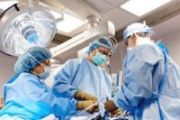Publication
Article
Surgical Rounds®
Are 30-day Survival Measures Related to Spikes in Mortality After Cardiac Surgery?
Author(s):
Many healthcare institutions and watchdog organizations look at 30-day survival after surgery as a measure of quality, but can those metrics adversely influence patient outcomes?

Many healthcare institutions and watchdog organizations look at 30-day survival after surgery as a measure of quality, but can those metrics adversely influence patient outcomes? A report published online April 9, 2014, in the journal Health Services Research claims they might.
A research team from the Johns Hopkins University School of Medicine in Baltimore, MD, set out to determine whether the 30-day survival quality metric may have unintended consequences for patients. To do so, they conducted a retrospective observational study using the Nationwide Inpatient Sample from 2005 through 2009 and reviewed all admission records coded for major cardiac surgery procedures. Then, they analyzed the day-by-day hazard function for all-cause in-hospital mortality at one-day intervals.
The authors found the pattern of postoperative mortality shifted on day 6 and day 30. They explained the shift on day 6 as potentially related to the difference between routine recovery and a complicated postoperative course. By day 6, patients who have done well have already been discharged, and those who have not may die within the first week.
According to the researchers, the change in hazard from day 30 to day 31 was 35% higher than on any other one-day increment. However, the abrupt increase in mortality at day 30 was not associated with an obvious organic cause.
In the interim between days 6 and 30, surgeons may be motivated to use more aggressive treatment, so the quality measure is positive, the authors explained. Patients may be treated despite inevitable death and at increased patient and family discomfort. They may also spend unnecessary, excessive days in intensive care units and die there instead of in more appropriate palliative care of step-down units.
The authors said further studies are needed to establish causality in cardiac surgery, and because they do not believe the phenomenon is exclusive to cardiac surgery, they indicated studies on other surgeries are needed, as well.

2 Commerce Drive
Cranbury, NJ 08512
All rights reserved.





